
Frederick Augustus I was a member of the House of Wettin who reigned as the last Elector of Saxony from 1763 to 1806 and as the first King of Saxony from 1806 to 1827. He was also Duke of Warsaw from 1807 to 1815, a short-lived disputed Grand Duke of Lithuania in 1812, and a legitimate candidate to the Polish throne.

Congress Poland or Congress Kingdom of Poland, formally known as the Kingdom of Poland, was a polity created in 1815 by the Congress of Vienna as a semi-autonomous Polish state, a successor to Napoleon's Duchy of Warsaw. It was established when the French ceded a part of Polish territory to the Russian Empire following France's defeat in the Napoleonic Wars. In 1915, during World War I, it was replaced by the German-controlled nominal Regency Kingdom until Poland regained independence in 1918.

The January Uprising was an insurrection principally in Russia's Kingdom of Poland that was aimed at putting an end to Russian occupation of part of Poland and regaining independence. It began on 22 January 1863 and continued until the last insurgents were captured by the Russian forces in 1864.
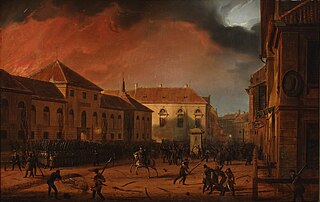
The November Uprising (1830–31), also known as the Polish–Russian War 1830–31 or the Cadet Revolution, was an armed rebellion in the heartland of partitioned Poland against the Russian Empire. The uprising began on 29 November 1830 in Warsaw when young Polish officers from the military academy of the Army of Congress Poland revolted, led by Lieutenant Piotr Wysocki. Large segments of the peoples of Lithuania, Belarus, and Right-bank Ukraine soon joined the uprising. Although the insurgents achieved local successes, a numerically superior Imperial Russian Army under Ivan Paskevich eventually crushed the uprising. The Russian Emperor Nicholas I issued the Organic Statute in 1832, according to which, henceforth Russian-occupied Poland would lose its autonomy and become an integral part of the Russian Empire. Warsaw became little more than a military garrison, and its university closed.

Leon Sapieha, sometimes written as Leon Sapiega, was a Galician noble (szlachcic) and statesman.

Count Mikhail Nikolayevich Muravyov was a Russian imperial statesman of the 19th century, most known for brutally putting down of Polish and Lithuanian uprisings and leading subsequent cultural and social depolonization of Northwestern Krai. He should not be confused with his grandson, Mikhail Nikolayevich Muravyov, who served as Russian Foreign Minister between 1897 and 1900.
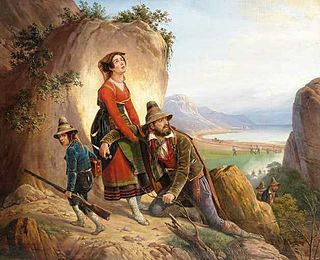
There were many resistance movements in partitioned Poland between 1795 and 1918. Although some of the szlachta was reconciled to the end of the Polish–Lithuanian Commonwealth in 1795, the possibility of Polish independence was kept alive by events within and without Poland throughout the 19th century. Poland's location on the North European Plain became especially significant in a period when its neighbours, the Kingdom of Prussia and Russia were intensely involved in European rivalries and alliances and modern nation states took form over the entire continent.
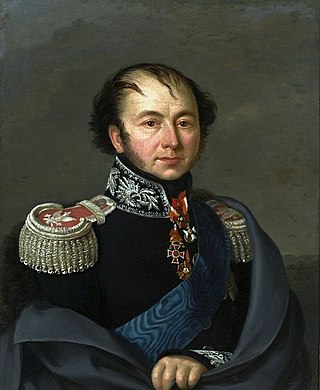
Prince Franciszek Ksawery Drucki-Lubecki was an important Polish politician, freemason and diplomat of the first half of the 19th century. He served as the minister of the treasury in the Congress Kingdom of Poland. He was nicknamed "Small Prince" because of his short height.
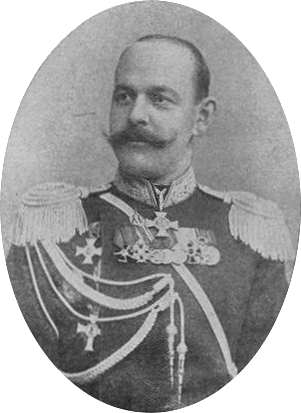
The Namiestnikof the Kingdom of Poland was the deputy of the Emperor of Russia who, under Congress Poland (1815–1874), styled himself "King of Poland". Between 1874 and 1914, when the former Congress Poland was known as the Vistula Country, the title Namiestnik was replaced by that of Governor-General of Warsaw .[a]

Zygmunt Andrzej Wielopolski was the President of Warsaw in the 19th century, during the time when Warsaw was part of Congress Poland. He was the son of the Marquis Aleksander Wielopolski and the nephew of Zygmunt Wielopolski (1863–1919), who was vice president of the National Polish Committee in 1914.
Administrative Council was a part of Council of State of the Congress Poland. Introduced by the Constitution of the Kingdom of Poland in 1815, it was composed of 5 ministers, special nominees of the King and the Namestnik of the Kingdom of Poland. The Council executed King's will, ruled in the cases outside the ministers competence and prepared projects for the Council of State.

The Russian Partition, sometimes called Russian Poland, constituted the former territories of the Polish–Lithuanian Commonwealth that were annexed by the Russian Empire in the course of late-18th-century Partitions of Poland. The Russian acquisition encompassed the largest share of the Polish–Lithuanian Commonwealth's population, living on 463,200 km2 of land constituting the eastern and central territory of the former Commonwealth. The three partitions, which took place in 1772, 1793 and 1795, resulted in the complete loss of Poland's and Lithuania's sovereignty, with their territories split between Russia, Prussia and Austria. The majority of Lithuania's former territory was annexed by the Russian Empire, except for Užnemunė which was annexed by Prussia.

Antanas Mackevičius was a Lithuanian Roman Catholic priest who was one of the leaders and initiators of the January Uprising in Lithuania.[a]
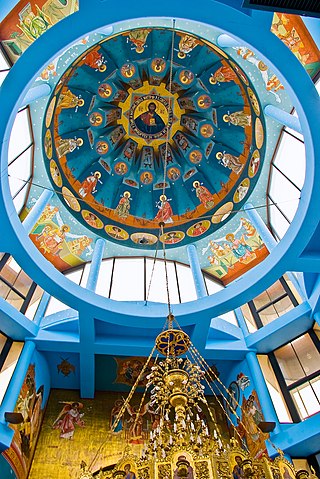
The Conversion of Chełm Eparchy was the forced conversion of the Eparchy of Chełm–Belz that took place between January and May 1875. It was the last eparchy of the Ruthenian Uniate Church that remained on the territory of the Russian Empire following the partitions of Poland. The episcopal seat of the eparchy was in the city of Chełm (Kholm) in Congress Poland. Adherents and clergy were forced to join the Russian Orthodox Church.
The early modern era of Polish history follows the Late Middle Ages. Historians use the term early modern to refer to the period beginning in approximately 1500 AD and lasting until around the Napoleonic Wars in 1800 AD.

Zygmunt Szczęsny Feliński was a professor of the Saint Petersburg Roman Catholic Theological Academy, Archbishop of Warsaw in 1862-1883, and founder of the Franciscan Sisters of the Family of Mary. He was canonised on 11 October 2009 by Pope Benedict XVI.
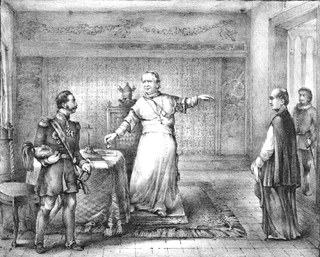
In the time of Pope Pius IX, Poland had long been partitioned among three neighbouring powers and no longer existed as an independent country. The Polish people lived under the rule of the Russian Empire, the Austrian Empire and Prussia.
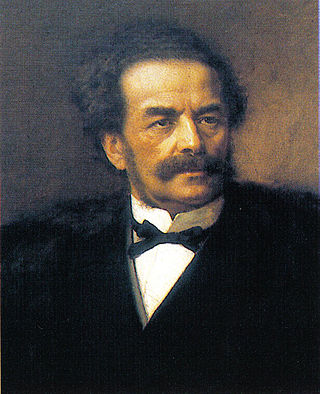
Leopold Stanisław Kronenberg was a Polish banker, investor, and financier, and a leader of the 1863 January uprising against the Russian Empire.
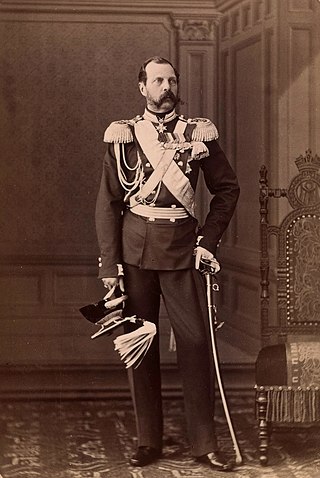
The government reforms imposed by Tsar Alexander II of Russia, often called the Great Reforms by historians, were a series of major social, political, legal and governmental reforms in the Russian Empire carried out in the 1860s.

The personal union of Poland and Saxony, or Saxony-Poland, was the personal union that existed from 1697 to 1706 and from 1709 to 1763 between the Electorate of Saxony under the House of Wettin and the aristocratic republic/elective monarchy of Poland-Lithuania. After the death of Augustus III of Poland in 1763, the personal union expired because the guardian of the still underage Saxon Elector Frederick Augustus III (1750–1827) renounced his claims to the throne and the Russian Empress Catherine the Great had her favorite Stanislaus II August Poniatowski elected king. In Poland, the period with Wettin rulers on the Polish throne is also called the Saxon period. In Polish memory it is known for its particular disorder.



















